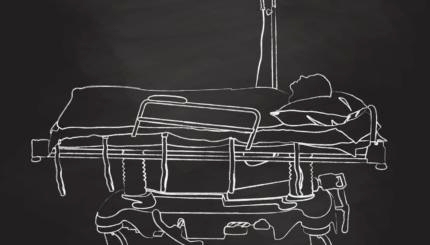Jewish laws regarding death and burial begin the moment the person dies, and focus on maintaining the dignity of the deceased person.
In the moments leading up to death, no one should leave the room except in extreme emergencies. The person is never to feel as if he or she is being left alone.
When death does occur, if the eyes remain open, an immediate family member should close them. It is customary to light a candle and place it near the head of the deceased person, and to cover the body with a sheet. Some people also open a window in the room, in order to allow the soul to depart.
From the moment that death occurs until the burial (which takes place as soon as possible) the body should not be left alone. Initially, family may choose to sit near the body and read psalms (particularly Psalm 23 and 91). Later, friends or community members may take up the post. On request Jewish funeral homes will provide a shomer, or a guardian, who does this while the body is being prepared for burial.

Help us keep Jewish knowledge accessible to millions of people around the world.
Your donation to My Jewish Learning fuels endless journeys of Jewish discovery. With your help, My Jewish Learning can continue to provide nonstop opportunities for learning, connection and growth.
If the death occurs in a hospital or another medical facility, the family should instruct the staff to be vigilant about preserving the dignity of the deceased, and be respectful of the body. Autopsies are typically not permitted according to Jewish law, primarily because they can be seen as disrespectful of the body, and thus the deceased. Organ donation, because it has potential to save a life, is permitted by Jewish law, but these decisions are usually made beforehand.
Some have the custom rending a garment of immediately after the death and reciting the blessing
Barukh ata adonai eloheinu melekh ha’olam dayan ha’emet.
Blessed are you, Lord Our God, Master of the Universe, the True Judge.
Today, it is much more common for this to be done immediately preceding the funeral.
A beautiful custom in some communities is to have the family and friends of the deceased use the moments after death to ask forgiveness from the deceased.
While the body remains accompanied, the rest of the home is also prepared for the mourning rituals. Mirrors are covered, to emphasize that mourners are not concerned with vanity, and funeral preparations are begun.
Sign up for a Journey Through Grief & Mourning: Whether you have lost a loved one recently or just want to learn the basics of Jewish mourning rituals, this 8-part email series will guide you through everything you need to know and help you feel supported and comforted at a difficult time.
Looking for a way to say Mourner’s Kaddish in a minyan? My Jewish Learning’s daily online minyan gives mourners and others an opportunity to say Kaddish in community and learn from leading rabbis.


